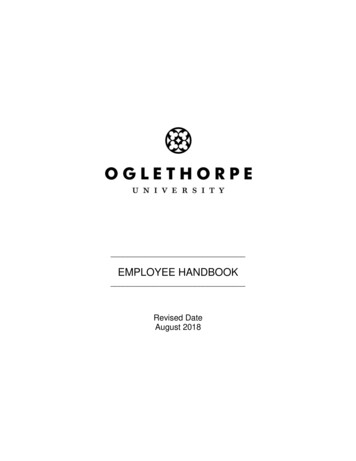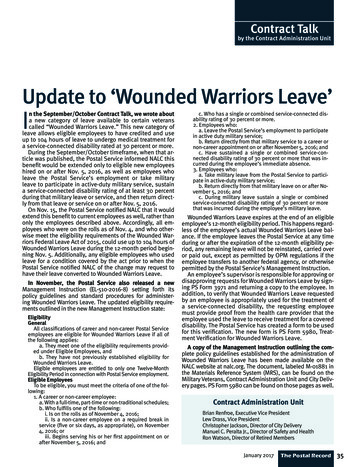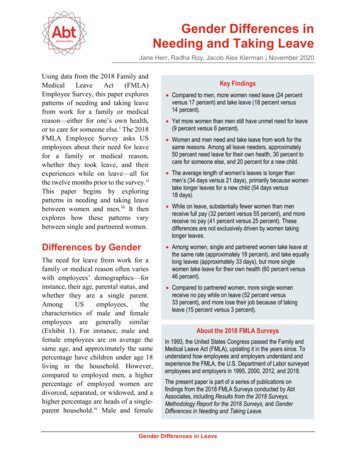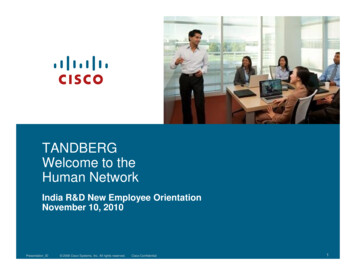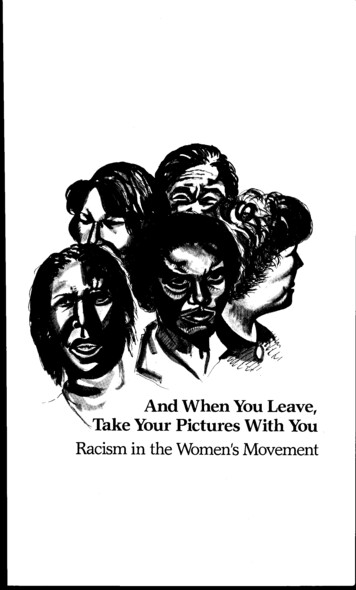
Transcription
And When You Leave,Take Your Pictures With YouRacism in the Women's Movement
61"The reason racism is a feminist issue is easily explained by theinherent definition of feminism. Feminism is the political theoryand practice to free all women: women of color, working-classwomen, poor women, physically challenged women, lesbians, oldwomen, as well as white economically privileged heterosexualwomen. Anything less than this is not feminism, but merely femaleself -aggrandizement."*Barbara SmithWe women of color are the veterans of a class and color war that isstill escalating in the feminist movement. This section attempts todescribe in tangible ways how, under the name of feminism, whitewomen of economic and educational privilege have used that privilegeat the expense of Third World women. Although the original intent ofincluding a section in this anthology specifically about racism in themovement was to make a connection with white women, it feels nowmore like a separation.Things have gotten worse. In academic and cultural circles, ThirdWorld women have become the subject matter of many literary andartistic endeavors by white women, and yet we are refused access tothe pen, the publishing house, the galleries, and the classroom. "Onlyfor the sake of art/Millicent, do you rise/tall from the ink" (Daniels).Our traditional native cultures are ripped off from us and are displayedas the artifacts of "primitive" peoples by white Bohemian liberatedwomen headed for the West Coast. In leftist feminist circles we aredealt with as a political issue, rather than as flesh and blood humanbeings. We represent the party line, but the truth is, "We're not ashappy as we look/on their/wall" (Carrillo). We have had it with theword "outreach" referring to our joining racist white women'sorganizations. The question keeps coming up – where exactly then, isin? It smells like white to us. We have had it.Repeatedly acknowledged throughout this section and infusing theentire contents of this anthology is our understanding that theory*From a talk given at the closing session at the National Women's Studies Association(NWSA) conference, May 1979; appeared in Frontiers, Vol. V, No. I, 1980.
62alone can not wipe out racism. We do not experience racism, whetherdirected at ourselves or others, theoretically. Neither do white women.How does one then emotionally come to terms with racism? None ofus in this book can challenge others to confront questions that we ourselves have not confronted. How do we deal with the ways in whichthis diseased society has infused our very blood systems? How do wetake personal responsibility for our own racist actions and assumptions?As Third World women we clearly have a different relationship toracism than white women, but all of us are born into an environmentwhere racism exists. Racism affects all of our lives, but it is only whitewomen who can "afford" to remain oblivious to these effects. The restof us have had it breathing or bleeding down our necks.But you work with what you have, whatever your skin color. Racismis societal and institutional. It implies the power to implement racistideology. Women of color do not have such power, but white womenare born with it and the greater their economic privilege, the greatertheir power. This is how white middle class women emerge amongfeminist ranks as the greatest propagators of racism in the movement.Rather than using the privilege they have to crumble the institutionsthat house the source of their own oppression – sexism, along withracism – they oftentimes deny their privilege in the form of "downward mobility," or keep it intact in the form of guilt. Guilt is not a feeling. It is an intellectual mask to a feeling. Fear is a feeling – fear oflosing one's power, fear of being accused, fear of a loss of status,control, knowledge. Fear is real. Possibly this is the emotional, nontheoretical place from which serious anti-racist work among whitefeminists can begin.The women writing here are committed feminists. We are challenging white feminists to be accountable for their racism because at thebase we still want to believe that they really want freedom for all of us.The letter from Audre Lorde to Mary Daly appearing in this section isan example to all of us of how we as feminists can criticize each other.It is an act of love to take someone at her word, to expect the most outof a woman who calls herself a feminist – to challenge her as you yourself wish to be challenged.As women, on some level we all know oppression. We must use thisknowledge, as Rosario Morales suggests, to "identify, understand, andfeel with the oppressed as a way out of the morass of racism and guilt.". . . For "We are all in the same boat."And it is sinking fast.
63And When You Leave,Take Your Pictures With YouJo CarrilloOur white sistersradical friendslove to own pictures of ussitting at a factory machinewielding a machetein our bright bandanasholding brown yellow black red childrenreading books from literacy campaignsholding machine guns bayonets bombs knivesOur white sistersradical friendsshould thinkagain.Our white sistersradical friendslove to own pictures of uswalking to the fields in hot sunwith straw hat on head if brownbandana if blackin bright embroidered shirtsholding brown yellow black red childrenreading books from literacy campaignssmiling.Our white sisters radical friendsshould think again.No one smilesat the beginning of a day spentdigging for souvenir chunks of uraniumof cleaning up afterour white sistersradical friendsAnd when our white sistersradical friends see us
64in the fleshnot as a picture they own,they are not quite as sureifthey like us as much.We're not as happy as we lookontheirwall.Jo Carrillo
65Beyond the Cliffs of Abiquiu*Jo CarrilloShe calls you a rock.He calls you a rock.They both agree that youare unworthyof anythingbut a slow death.Her skin is white;more parched thanthe land she hates.Silver fades into her armturquoise matchesnothingmore than hereyesbut she wears it.two cliffs little trees lots of rocksis this land nothing but a rock? she askswhile gracefully walking back to herMGOH, yes I know, I live herein this desertand let me tell you . . .!The whole place isparched.Just one great big rock.Let me see,do I have time to put on mymymysquash blossom.*My poem to the land that, along with South Dakota, is a "proposed National Sacrifice"area for energy uranium, coal, coal gasification, etc.).
66Jo CarrilloIt's Authentic Navajo Indian Laguna Pueblodesign fromBuen Muir Indian Trading Postcompletelystaffedbywhitesexcept of coursefor the janitor.How can it bethat the minesthe uranium cancer causing dangerous radon gas emitting minesare worked by Navajos and other assortedtypesand the trading postsare allallworked overby whites?The mines belong to themtoo;don't enjoy the work as much?Rather sell Authentic Navajo Hopi Zuni Indian maderealliveLaguna Santa Ana Santo Domingos?It'slessof a mess.Oh, those Indians.They arealljustdrunks.Can't even go through Gallupwithout seeing at leastat leastat leastten of them.
Jo CarrilloOh, let's step into this Navajo rug shopwhile we're here.Bet you don't have thatin San Francisco Los Angeles New YorkAlbuquerque.They are really lovely rugsmy whole house is doneinNavajo rugsit's adobein Corralesby the riverlots ofrichwhiteswith Authentic Navajo Hopi Zuni Indian made real liveLaguna Santa Ana Santo Domingoartifacts.There is a villageoverthathill.67
68I Don't Understand ThoseWho Have Turned Away From MeChrystos5:23 am — May 1980I am afraid of white people Never admitted that before deepsecretI think about all the white women I knew in San FranciscoWomen with Master's degrees from Stanford University & cars thatdaddy bought, women with straight white teeth & clear skins fromthousands of years of proper nutrition They chose to be poorThey were quite convincing in the role of oppressed victim I wantto tell them to go down to Fillmore & Haight & tell somebody aboutit Tell Jim my old landlord who picked cotton since he was 6moved here for a better life lost his hearing & his teeth & his hair fromworking in the shipyards for 35 years The constant vibration of hisdrill on the metal literally shook his teeth out He went bald fromalways wearing a safety helmet He can't hear after years of thatracket He worked so hard for 35 years & he is still poor They liveon Webster street, across from the projects The house is an oldVictorian which will not be paid off unless he lives to be 89 whichis unlikely.I read the funniest line in a health book yesterday It said, that forsome "unknown" reason, more black people had hypertension thanwhite people Not funny No mystery Most Indian people don'tusually live long enough to even GET hypertension All the deaths Icarry so heavily Faces I knew Mani murdered in Phoenix by whitesoutside a bar whites who still have not gone to trial Ron dying ofpneumonia I still mourn him death None of my relatives has adegree from Stanford Neither did Jim So those poor white girls arestill suffering mightily in my old home town of San FranciscoIt did not help that it occurred to me that no amount of educationwas going to improve my lot in life if I didn't also change my attitudeabout the society I still think that 98% of what happens — liberal, conservative or radical lesbian separatist is: bullshit My attitude is all Iown so I quit schoolAll the schools & crazy houses I was in were simply brainwashing &most of the feminist movement that I worked so hard to be a part ofwas propaganda This is heresy but it held no solution for me SurelyJane suffers oppression on her job because she is a woman All theproblems and issues which feminism raises are valid & important Itsimply does not give me any answers for correct behavior in my own
Chrystos69life Certainly I won't obey that lesbian mafia nonsense that one mustdress in a certain way or cut off one's hair to be real Those are all themost superficial rules silly I no longer believe that feminism is a toolwhich can eliminate racism – or even promote better understandingbetween different races & kinds of women I have felt less understanding between different races & from many lesbian women than Ido from some straight people At least their heterosexual indifferenceallows me more freedom to be myself I felt so much stricture &censorship from lesbians I was supposed to be a carpenter to prove Iwas a real dyke My differences were sloughed over None of themcame to a pow wow or an AIM * fundraiser to see about me Above all Icould not enjoy & love being a woman Jane commented when I firstmet her that she didn't care for most lesbians because they didn't likewomen didn't like themselves Of course it is extremely difficult tolike oneself in a culture which thinks you are a diseaseMany of the lesbians I knew seemed to throw off the outer trappingsof their culture & were very vocal in criticizing it Yet, they had no joy,no new roads Night after night in endless picky meetings discussingeveryone's inadequacies & faults & the harm which men do or nightafter night in dreary body shop bars drinking themselves into a stuporI worked so hard as part of a local women's coffeeshop & bookstore,harder than I've ever worked I ordered for the kitchen, & the artshows, did shifts, brought flowers, cleaned, met the pest man &phoneman, did entertainment, washed a million coffee cups Recentlysomeone told me that a young lesbian whose parents have given her alaw practice, commented that she remembered me I didn't work shesaid all I did was talk to people I remember her too she was one ofthe thousands of women whose names & faces I memorized & tried tounderstand only to have them disappear after 3 months or wheneverthey found a lover After 31/2 years I had so little left of myself somany bitter memories of women who disrespected me & others Awoman who called herself a communist but supported capitalistenterprises of women, rather than our brave collective worker-ownedeffort The lies, pretensions, the snobbery & cliquishness The racismwhich bled through every moment at every level The terrifying &useless struggle to be accepted The awful gossip, bitchiness,backbiting & jealousy The gross lack of loveI left the women's movement utterly drained I have no interest inreturning My dreams of crossing barriers to true understanding werefalse Most of the white women I thought I was close to want nothingto do with me now Perhaps white women are so rarely loyal because*American Indian Movement.
70Chrystosthey do not have to be There are thousands of them to pick up &discard No responsibility to others The bathing beauties They wantthe status of reality & respect without labor Respect us simplybecause we exist Give us what we want now My bitterness distortsmy wordsI don't understand those who turned away from me
71Asian Pacific American Womenand FeminismMitsuye YamadaMost of the Asian Pacific American women I know agree that weneed to make ourselves more visible by speaking out on the conditionof our sex and race and on certain political issues which concern us.Some of us feel that visibility through the feminist perspective is theonly logical step for us. However, this path is fraught with problemswhich we are unable to solve among us, because in order to do so, weneed the help and cooperation of the white feminist leaders, thewomen who coordinate programs, direct women's buildings, and editwomen's publications throughout the country. Women's organizationstell us they would like to have us "join" them and give them "input."These are the better ones; at least they know we exist and feel wemight possibly have something to say of interest to them, but everytime I read or speak to a group of people about the condition of my lifeas an Asian Pacific woman, it is as if I had never spoken before, as if Iwere speaking to a brand new audience of people who had neverknown an Asian Pacific woman who is other than the passive, sweetetc. stereotype of the "Oriental" woman.When Third World women are asked to speak representing ourracial or ethnic group, we are expected to move, charm or entertain,but not to educate in ways that are threatening to our audiences. Wespeak to audiences that sift out those parts of our speech (if what wesay does not fit the image they have of us), come up to shake our handswith "That was lovely my dear, just lovely," and go home with thesame mind set they come in with. No matter what we say or do, thestereotype still hangs on. I am weary of starting from scratch eachtime I speak or write, as if there were no history behind us, of hearingthat among the women of color, Asian women are the least political, orthe least oppressed, or the most polite. It is too bad not many peopleremember that one of the two persons in Seattle who stood up tocontest the constitutionality of the Evacuation Order in 1942 was ayoung Japanese American woman. As individuals and in groups, weAsian Pacific women have been (more intensively than ever in thepast few years) active in community affairs and speaking and writingabout our activities. From the highly political writings published inAsian Women in 1971 (incisive and trenchant articles, poems andarticles), to more recent voices from the Basement Workshop in New
72Mitsuye YamadaYork City to Unbound Feet in San Francisco, as well as those AsianPacific women showcased at the Asian Pacific Women's Conferencesin New York, Hawaii and California this year, these all tell us we havebeen active and vocal. And yet, we continue to hear, "Asian womenare of course traditionally not attuned to being political," as if mostother women are; or that Asian women are too happily bound to theirtraditional roles as mothers and wives, as if the same cannot be said ofa great number of white American women among us.When I read in Plexus recently that at a Workshop for Third Worldwomen in San Francisco, Cherrie Moraga exploded with "What eachof us needs to do about what we don't know is to go look for it," I feltlike standing up and cheering her. She was speaking at the Women'sBuilding to a group of white sisters who were saying, in essence, "it isyour responsibility as Third World women to teach us." If the majorityculture know so little about us, it must be our problem, they seem to betelling us; the burden of teaching is on us. I do not want to be unfair; Iknow individual women and some women's groups that have takenon the responsibility of teaching themselves through reaching out towomen of color, but such gestures by the majority of women's groupsare still tentatively made because of the sometimes touchy reaction ofwomen who are always being asked to be "tokens" at readings andworkshops.Earlier this year, when a group of Asian Pacific American womengathered together in San Francisco poet Nellie Wong's home to talkabout feminism, I was struck by our general agreement on the subjectof feminism as an ideal. We all believed in equality for women. Weagreed that it is important for each of us to know what it means to be awoman in our society, to know the historical and psychological forcesthat have shaped and are shaping our thoughts which in turn determine the directions of our lives. We agreed that feminism means acommitment to making changes in our own lives and a conviction thatas women we have the equipment to do so. One by one, as we sataround the table and talked (we women of all ages ranging from ourearly twenties to the mid-fifties, single and married, mothers andlovers, straight women and lesbians), we knew what it was we wantedout of feminism, and what it was supposed to mean to us. For womento achieve equality in our society, we agreed, we must continue towork for a common goal.But there was a feeling of disappointment in that living room towardthe women's movement as it stands today. One young woman said shehad made an effort to join some women's groups with high expectations but came away disillusioned because these groups werereceptive to the issues that were important to her as an Asian woman;
Mitsuye Yamada73Women in these groups, were, she said "into pushing their own issues"and were no different from the other organizations that imposedopinions and goals on their members rather than having them shapedby the needs of the members in the organizations. Some of the otherwomen present said that they felt the women's organizations withfeminist goals are still "a middle -class women's thing." This pervasivefeeling of mistrust toward the women in the movement is fairly representative of a large group of women who live in the psychologicalplace we now call Asian Pacific America. A movement that fightssexism in the social structure must deal with racism, and we hadhoped the leaders in the women's movement would be able to see theparallels in the lives of the women of color and themselves, and would"join" us in our struggle and give us "input."It should not be difficult to see that Asian Pacific women need toaffirm our own culture while working within it to change it. Many ofthe leaders in the women's organizations today had moved naturallyfrom the civil rights politics of the 60's to sexual politics, while veryfew of the Asian Pacific women who were involved in radical politicsduring the same period have emerged as leaders in these samewomen's organizations. Instead they have become active in groupspromoting ethnic identity, most notably ethnic studies in universities,ethnic theater groups or ethnic community agencies. This doesn'tmean that we have placed our loyalties on the side of ethnicity overwomanhood. The two are not at war with one another; we shouldn'thave to sign a "loyalty oath" favoring one over the other. However,women of color are often made to feel that we must make a choicebetween the two.If I have more recently put my energies into the Pacific AsianAmerican Center (a job center for Asians established in 1975, the onlyone of its kind in Orange County, California) and the Asian PacificWomen's Conferences (the first of its kind in our history), it is becausethe needs in these areas are so great. I have thought of myself as afeminist first, but my ethnicity cannot be separated from my feminismThrough the women's movement, I have come to truly appreciatethe meaning of my mother's life and the lives of immigrant womenlike her. My mother, at nineteen years of age, uprooted from her largeextended family, was brought to this country to bear and raise fourchildren alone. Once here, she found that her new husband who hadbeen here as a student for several years prior to their marriage was abachelor-at-heart and had no intention of changing his lifestyle.Stripped of the protection and support of her family, she found theresponsibilities of raising us alone in a strange country almost intolerable during those early years. I thought for many years that my
Mitsuye Yamada74mother did not love us because she often spoke of suicide as an easyway out of her miseries. I know now that for her to have survived "justfor the sake" of her children took great strength and determination.If I digress it is because I, a second generation Asian Americanwoman who grew up believing in the American Dream, have come toknow who I am through understanding the nature of my mother'sexperience; I have come to see connections in our lives as well as thelives of many women like us, and through her I have become moresensitive to the needs of Third World women throughout the world.We need not repeat our past histories; my daughters and I need notmerely survive with strength and determination. We can, throughcollective struggle, live fuller and richer lives. My politics as a womanare deeply rooted in my immigrant parent's and my own past.Not long ago at one of my readings a woman in the audience said shewas deeply moved by my "beautifully tragic but not bitter camppoems which were apparently written long ago," but she wasdistressed to hear my poem "To A Lady." "Why are you, at this latedate, so angry, and why are you taking it so personally?" she said. "Weneed to look to the future and stop wallowing in the past so much." Iresponded that this poem is not at all about the past. I am talking aboutwhat is happening to us right now, about our nonsupport of eachother, about our noncaring about each other, about not seeing connections between racism and sexism in our lives. As a child of immigrantparents, as a woman of color in a white society and as a woman in apatriarchical society, what is personal to me is political.These are the connections we expected our white sisters to see. Itshould not be too difficult, we feel, for them to see why being a feminist activist is more dangerous for women of color. They should be ableto see that political views held by women of color are often misconstrued as being personal rather than ideological. Views critical of thesystem held by a person in an "out group" are often seen as expressionsof personal angers against the dominant society. (If they hate it somuch here, why don't they go back?) Many lesbians I know have feltthe same kind of frustration when they supported unpopular causesregarded by their critics as vindictive expressions to "get back" at thepatriarchical system. They too know the disappointments of havingtheir intentions misinterpreted.In the 1960's when my family and I belonged to a neighborhoodchurch, I became active in promoting the Fair Housing Bill, and one ofmy church friends said to me, "Why are you doing this to us? Haven't*Camp Notes and Other Poems by Mitsuye Yamada (San Francisco: Shameless HussyPress) 1976.
Mitsuye Yamada75you and your family been happy with us in our church? Haven't wetreated you well?" I knew then that I was not really part of the churchat all in the eyes of this person, but only a guest who was being told Ishould have the good manners to behave like one.Remembering the blatant acts of selective racism in the past threedecades in our country, our white sisters should be able to see howtenuous our position in this country is. Many of us are now third andfourth generation Americans, but this makes no difference; periodicconflicts involving Third World peoples can abruptly change whiteAmerican's attitudes towards us. This was clearly demonstrated in1941 to the Japanese Americans who were in hot pursuit of the greatAmerican Dream, who went around saying, "Of course I don't eatJapanese food, I'm an American." We found our status as true-bloodedAmericans was only an illusion in 1942 when we were singled out tobe imprisoned for the duration of the war by our own government.The recent outcry against the Iranians because of the holding ofAmerican hostages tells me that the situation has not changed since1941. When I hear my students say "We're not against the Iranians herewho are minding their own business. We're just against thoseungrateful ones who overstep our hospitality by demonstrating andbadmouthing our government," I know they speak about me.Asian Pacific American women will not speak out to say what wehave on our minds until we feel secure within ourselves that this is ourhome too; and until our white sisters indicate by their actions that theywant to join us in our struggle because it is theirs also. This means acommitment to a truly communal education where we learn fromeach other because we want to learn from each other, the kind of commitment we do not seem to have at the present time. I am still hopefulthat the women of color in our country will be the link to Third Worldwomen thoughout the world, and that we can help each other broadenour visions.
76Millicent FredericksGabrielle DanielsMillicent Fredericks is part of my anthology of forgotton ThirdWorld women celebrated in poetry, A Woman Left Behind. She wasAnais Nin's housemaid, and the quotes about her and on black people in general are the original ones from Anais' Diary.Millicent has been on my mind since I first read the Diaries whilegetting my B.A. (I am going for my Master's now). One day it justpoured out. I haven't been able to find a publisher for her, becausesome people will not touch it. Too much for them to take, I guess.Too damn bad. All our saints have a few taints of sin . . .Millicent Fredericks was a black woman from Antigua, who married an American black man and had four children. He had a tradeas a tailor that he refused to implement after a while. Millicent wasan alien, therefore she could not teach school as she had in Antigua.The only way out was housework. As far as I know she remainedthe sole support of her family. As noted in the Diaries of Anais Nin,one son was shot up in a gang war.Here were two women, one black and one white, both educatedand silenced in their own ways, yet could not help each otherbecause of race and class differences.Anais could not get beyond the fact of Millicent's blackness andpoverty and suffering. The stench of the padrona just reeks about her."I would like to write the life of Millicent. But saints' lives are difficult to do . . . A Negro is a concept . . . Millicent perhaps.becomes a symbol of what they have to endure . . . the very firstday she came to me sent by my mother and she sat sewing, thethread rolled to the floor and I picked it up for her . . . This gesture established the quality of our relationship . . . I would like todevote my life to the recognition of the Negro's equality, but Ialways feel ineffectual in political battles . . . one can only win byforce or trickery . . . she has fine features, which a Gauguinwould have enjoyed painting . . . " — from the Diary of Anais Nin.
Gabrielle DanielsOnly for the sake of artMillicent, do you risetall from the inkin the pupils you soughtdark and widetaking you in like the lettersyou would have performedscratched indelibly on slated memories, chalk dustgold on your fingers. A teacher.From A to Bfrom Antigua to Harlemis no giant step. Brown syrupfrom the cane stills of homestick like skinadheres to the sharpened ribs of shanty girlsrunning careless like your husband from responsibilitycatches white heat rubbing shoulderson the New York trolley, the floors and windowssucking the strength from your maid's fingersyour teats dribbling the same tar sweetness onto your smacking children the same curse.Beyond introductionsthe thread of your lives intersected,ran from the tangled nest in the sewing basket.The spools dared equality. Two alienstwo mothers well met, living on little thanks.The pin money feebly spread outfor Dad and his drink, Patchena pair of shoes for the youngest, the pressPressure. Glimpses in the lilt of clipped Englishfrom both sides of the ocean:Harlem clubs, black street gangs cutting upa son, the broken families and the literatidining on themselvesThe mending to be done, the mending of wordsthe hunger knit in the growling guts of the mindPublish, publish our cries.You the ministrantabove the small white factwhich was but one seam77
78pinched in emergency in the creeping taxiis your last conscious scene.No curtain calls in the proceeding pagesin the wake of her saving move to California,you continueto rummage through days-old bread,trickle down shops. The killing routineshe admired of you, and because of youescaped to write, to cable Henryever the last sum. "The writer", she said,"must be served and taken care of",lessening the timeyou could afford for breathto clean your own home for Sunday meetin'Perhaps to dust off your teacher's diplomawith more care.No islander, despite her praiseGauguin could not have tracedthe furrows in your face,the buried seeds waiting in vainfor spotlightto flowera smile, Madonna, smile please .In your uniformyou were like everyone of themat war to surviveand then like no other. I have learnedfrom such self-denial,martyrs and saints are madeor forgotten.Gabrielle Daniels
79But I Know You,American Woman"" —Judit MoschkovichI am Latina, Jewish and an immigrant (all at once). Wh
daddy bought, women with straight white teeth & clear skins from thousands of years of proper nutrition They chose to be poor They were quite convincing in the role of oppressed victim I want to tell them to go down to Fillmore & Haight & tell somebody about it Tell Jim my old landlord who picked cotton since he was 6
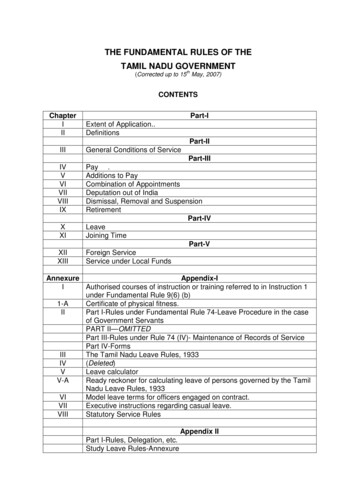
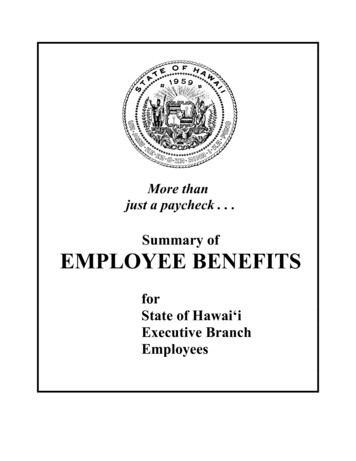
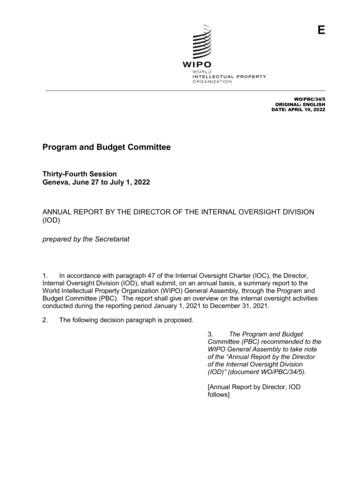
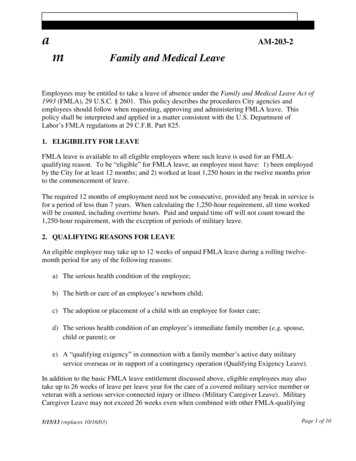
![FMLA Time Types and Leave Code Powerpoint-mw [Read-Only]](/img/56/fmla-time-types-leave-code-110612.jpg)


